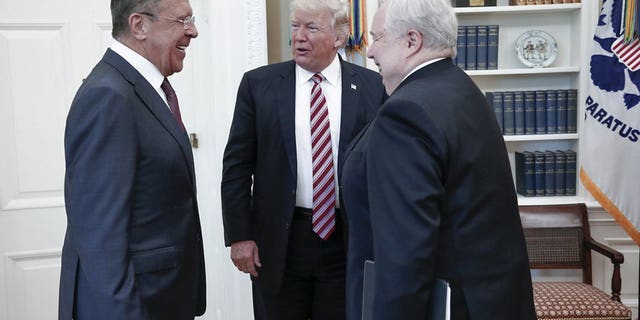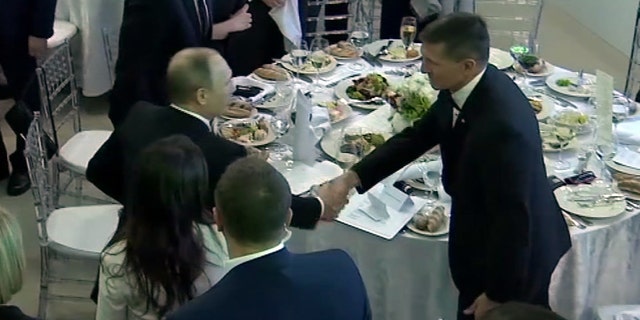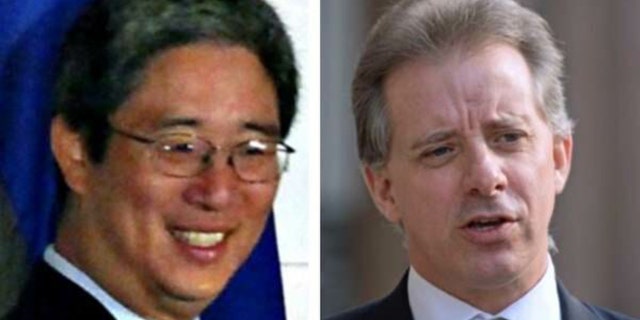There is no one else to blame but President Trump if there’s a partial government shutdown later this week.
The president said he would take the recriminations if there’s a shutdown. The question now is whether Trump will sign a spending bill that doesn’t fund his border wall.
“A lot of us are trying to help him,” Senate Appropriations Committee Chairman Richard Shelby, R-Ala., lamented when asked about the effort to secure dollars for the border wall. “It didn’t work out.”
And so in the coming days, the House and Senate will likely approve some form of a short-term spending measure to avert a partial government shutdown in the wee hours of Saturday morning. If there's no action, then nine federal departments would close just days before Christmas. Instead, a tentative, stopgap package simply re-ups the remaining seven spending bills at current levels through Feb. 8.
“If we do go to February, what happens then?” asked Shelby, not so rhetorically.
Not much changes. Except Democrats will control the House next year.
Senate Majority Leader Mitch McConnell, R-Ky., seemed mystified as to why House Minority Leader Nancy Pelosi, D-Calif., would want to wrestle with government funding issues when she matriculates to the speaker’s suite in January.
“I believe that incoming Speaker Pelosi has little latitude to make a deal,” McConnell observed. “I would assume her preference would be to roll out the new Democratic agenda with the fresh, new Democratic Congress.”
“I believe that incoming Speaker Pelosi has little latitude to make a deal. I would assume her preference would be to roll out the new Democratic agenda with the fresh, new Democratic Congress.”McConnell added that he thought punting to February “would be the least desirable outcome from the speaker’s point of view.”
— Senate Majority Leader Mitch McConnell, R-Ky.
Au contraire.
To quote McConnell, this is “the new Democratic agenda with the fresh, new Democratic Congress.”
Democrats flipped the House in part because Trump proved virulent in key districts. Pelosi is more than happy to tangle with the president over an issue like the border wall. The wall may energize Trump’s core supporters and enrapture red states. But the wall is utterly toxic in swing districts and suburbia.
That scenario helps Pelosi on two fronts. It presents the California Democrat a fulcrum to use for leverage against the president and simultaneously on behalf of liberal Democrats in her caucus.
Moreover, an elongated wall fight would potentially help Pelosi temper the narrative that all her side will do is investigate Trump.
To be sure, there will be plenty of investigating of the Trump administration by a Democratic House. But there are only so many cubic centimeters of available news oxygen.
A February fight over the wall means news outlets will have to devote some time to the wall brawl and not just focus on alleged misdeeds by the president.
Is there any question who prevailed here? If this were a boxing match, you could hear the bell clanging at ringside. Ding-ding-ding. Round one is over. The judges would award a unanimous decision to Pelosi.
The looming question now is will Trump sign a bill – sans wall – to avert a government shutdown this weekend?
Trump has been unpredictable on this issue before. In March, members of the president’s administration negotiated an omnibus spending package to avoid a government shutdown. Budget Director and now Acting White House Chief of Staff Mick Mulvaney ballyhooed the merits of the deal. The House and Senate approved the plan.
But just hours before the deadline, the president almost sparked a government shutdown when he threatened to veto the measure. He ultimately signed the accord.
Trump faced a revolt from his base when details leaked out about the size and scope of the omnibus spending package. One wonders if the president may reject anything Congress passes -- especially if his partisans threaten mutiny.
That’s the quintessence of the problem stemming from the Oval Office meeting Trump conducted last week with Pelosi and Senate Minority Leader Chuck Schumer, D-N.Y. Trump threatened a shutdown and took responsibility. The bravado invigorated the president’s loyalists. But Trump’s bluster could backfire if he retreats now.
White House spokeswoman Sarah Sanders indicated on multiple occasions Tuesday that the administration could still build the wall – even without a congressional appropriation.
“There’s certainly a number of different funding sources that we’ve identified that we can use to couple with the money that would be given to us through congressional appropriations that would help us get to that $5 billion,” Sanders said.
“There’s certainly a number of different funding sources that we’ve identified that we can use to couple with the money that would be given to us through congressional appropriations that would help us get to that $5 billion.”Such a maneuver is called “reprogramming,” in congressional-ese: Take money Congress already passed and “reprogram” it for a purpose other than the original intent. Trump signed into law the Military Construction/VA appropriations bill. The Army Corps of Engineers budget falls under the “MilCon/VA” bill. It’s possible the Trump administration could request a “reprogramming” of Army Corps of Engineers money for the wall. But that gambit requires sign-off by key members of the House and Senate appropriations Committees.
— White House press secretary Sarah Sanders
“They have to have congressional blessing for most reprogramming,” Pelosi said
That said, an administration can shift a little bit of money for purposes not sanctioned by Congress. But we’re only talking about a few million dollars here. That’s million with a “M.” Pocket lint in Washington.
The Trump administration says it’s seeking potential routes to bypass Congress. That’s a problem because Article I, Section 9 of the Constitution grants Congress the power of the purse.
“They should read the Constitution,” said one person familiar with the congressional appropriations process. Another source said “It would create a sh--storm” if the White House tried to circumvent Capitol Hill.
Don’t congressional Republicans have the back of the president? As Shelby said, they tried to help. But the political street couldn’t accommodate what Trump requested. Remember that many GOPers fear voters could blame them for a shutdown. So they were willing to cash it in.
A scenario like this one seems to unfold in much the same way every Christmas in Washington. There’s a crisis du jour. The sides appear steeled in their resolve. And then, almost at the last minute, somebody buckles not long before Santa slides down the chimney.
In truth, the outcome of this impasse was likely determined by the most influential people in Washington. Not the lawmakers, but the lawmakers spouses and their families. After all, they want to get everyone home for Christmas.




















